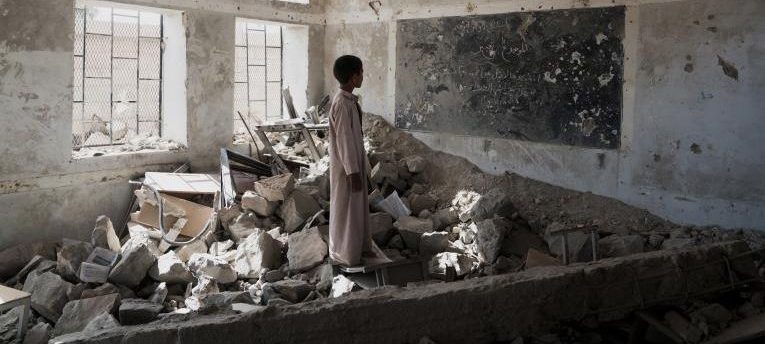Updates & Press
Featured | July 9, 2021
Weekly Humanitarian News Digest – July 9
Author | MedGlobalComms

Each week, we highlight the latest news related to the humanitarian and health crises in our countries of operation: Bangladesh/ Myanmar, Colombia/ Venezuela, Gaza/ Palestinan Territories, India, Lebanon, Pakistan, Sudan, Syria, and Yemen. For more frequent updates, make sure to follow us on Facebook, Instagram, and Twitter.
Cover Image: Clarke for UNOCHA
Latest News for July 2 – July 9, 2021
Bangladesh/ Myanmar
COVID-19 cases in Cox’s Bazar have risen, but Rohingya are still waiting to receive their first vaccine dose. Despite the best efforts of health workers in Cox’s Bazar, Bangladesh, officials report higher rates of COVID-19 cases in the last few days than have been seen recently. The Rohingya are included in the Bangladesh government’s vaccine rollout plan, but vaccine shortages have prevented any Rohingya in Cox’s Bazar from receiving the vaccine. (Dhaka Tribune)
Colombia/ Venezuela
The Spanish Agency for International Development Cooperation (AECID) makes donation to support integration of Venezuelan migrants into Columbia. Alongside the Inter-American Development Bank (IDB), AECID has donated 50 million euros in loans to Barranquilla, a city in Colombia, in order to facilitate socioeconomic integration of Venezuelan migrants. Barranquilla has taken in 140,000 Venezuelan migrants, nearly 10% of the city’s total population. This donation is a good step towards filling the funding gaps seen so far during the Venezuelan migration crisis. (ReliefWeb)
Venezuelan migrants living in informal Columbian settlements struggle with malnutrition and water sanitation issues. An ‘endless lake of cardboard and tin shacks’ has sprung up as an informal settlement in Maicao for Venezuelan migrants entering Columbia. Food and water are both in short supply for the inhabitants of this camp, and the water that does enter the camp is extremely expensive and untreated. Many suffer from malnutrition and intestinal diseases related to untreated water. (The Guardian)
Gaza/ Palestinian Territories
Complex wounds have long-term health consequences due to limited health infrastructure in Gaza. Complex wounds during conflict often occur as a result of being hit by shelling or ammunition and need quick, responsive treatment, or amputation. These services are often beyond what local health services or aid organizations are able to provide. With health infrastructure on a decline, many Palestinians are suffering from chronic pain and deadly infections from complex wounds incurred years ago with no relief in sight. (The Guardian)
India
As COVID-19 cases surge, poor families in rural areas have been hit the hardest. COVID-19 has devastated India’s economy, and has led to a 75% (on average) decrease in household income. Many have lost their jobs due to the pandemic. These conditions have compounded existing issues of debt and income inequality in rural areas, leading to an increased risk for malnutrition and preventable diseases for families unable to afford food or adequate shelter. (Reuters)
Lebanon
Lebanon is a mere ‘days away from social explosion’. According to the World Bank, the world hasn’t seen an economic crisis like the current crisis in Lebanon in 170 years. Currency devaluation and chronic shortages leave Lebanese people quite literally in the dark as they struggle to pay for food & medicine, access health care, and pay for fuel amid a growing crisis. (The Independent)
Pakistan
The WHO announces commitments to address gender-based barriers to polio vaccination at the Gender Equality Forum (GEF). Women have long played a major role in Pakistan’s polio eradication programme, and are the main drivers behind vaccinations in hard to reach areas. These new commitments will support these women in their public health efforts, prioritize full participation of women in health campaigns, and seek to understand and break down cultural barriers to vaccinations. (Global Polio Eradication Initiative)
Sudan
Rising greenhouse gas emissions put millions at increased risk of mosquito-borne diseases. The London School of Hygiene & Tropical Medicine (LSHTM) recently published a study in the Lancet Planetary Health journal stating how rising emission levels could lengthen the mosquito-borne disease transmission season by 4 months for dengue fever and 1 month for malaria. Conversely, the study provides insight into how global prioritization of lowering greenhouse emissions could have a significant, positive impact on health for millions of people. (The Guardian)
Syria
International Rescue Committee (IRC) data reveals an increase of suicide rates in North West Syria alongside record high need for humanitarian aid. As the deadline to renew the cross-border aid resolution in NW Syria fast approaches, new data shows a startling lack of mental health infrastructure in Syria. In NW Syria, there is only 1 psychiatrist per 1 million people. According to the IRC, 93% of people surveyed believe that suicide rates have risen in recent years. Depression, loss of hope, and domestic violence were cited as the main reasons for the prevalence of suicide in NW Syrian communities. (IRC)
Without a renewal of cross-border assistance in NW Syria, over 1 million will starve, education will suffer, and existing hospitals would be left without support. The vote to renew cross-border humanitarian aid at the Bab al-Hawa crossing has become politicized, threatening the health and safety of millions. According to Dr. Zaher Sahloul, president of MedGlobal, “The large-scale weaponisation of humanitarian aid is something that the Syrian regime invented.” Cross-line operations in Syria are described as ‘delayed, uncoordinated, and inadequate’, and no substitute for the magnitude of cross-border aid. (Middle East Eye)
Yemen
Two million Yemeni children are out of school due to ongoing armed conflict and economic collapse. This is double the number of children that were out of school in 2015, and UNICEF estimates that the number of children not receiving an education could rise to 6 million. Disruption in education during times of crisis perpetuates dangerous cycles of poverty, food insecurity, and lack of opportunity that all lead to negative health outcomes. (UNICEF)


